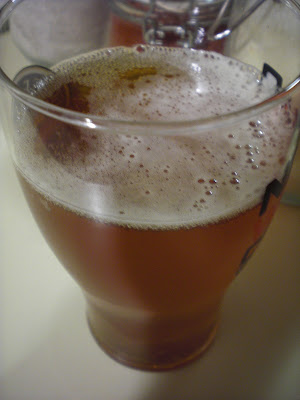Thursday, July 29, 2010
Bluebird Bitter!
Amazing! I was extremely surprised to find a bottle of Bluebird Bitter in the case of my newly discovered local liquor store. The fact that I can get a six pack and a sandwich at the same time is a winner in my book. Bluebird Bitter is a well known English bitter, and something I was very eager to try. Most English bitters and similar beers are not transported to the US at all because of their relatively low alcohol content. Low alcohol beers do not store well for long periods of time, and obviously low alcohol beers which sell for less money tend to be less worthwhile for shippers and distributors. Combine this with the relative obscurity of the style, and a very misleading name which is unappealing to many American beer drinkers, and you've got the perfect storm for a beer style you will almost never see reach American soil. Naming a beer style "bitter" is truly something that would never happen today. Bitter is, in fact, not very bitter at all (especially compared to the super bitter IPAs or the mouth-puckering swill you can buy in cans). Bitter as a name originated at a time when comparable beer would have had very little bittering at all. So bitter was probably called such not just because it was primarily a bitter beer, but because it was bittered with hops to a noticeable degree at all. The designation "bitter" seems to have started in the pubs as a nickname more than an official designation. At the time, most pubs had two offerings: bitter and mild, so the names were more relative than quantitative. In the words of beer writer Michael Jackson: "How bitter? More bitter than the mild." Of course, the history of beer name origins are all murky and people are apt to believe what the want. All this led up to me squealing* with glee at the sight of a bottle at the store. Sadly, though, the aforementioned short shelf life, and poor handling of the bottle led to a mediocre drinking experience. I was not very surprised, and beer is beer, so I enjoyed it nonetheless.
It was sadly, a bit skunky. It had a very mild flavor and aroma which led me to wonder how long it had been on the shelf. It was still very drinkable and seemed to have a minerally, British sort of finish. There was some body, though not much, and almost no sweetness. This is in contrast to most American versions of this style, which are almost like dessert beers in their sweetness and fullness. Overall, this was very nicely balanced, despite the effects of age. I could certainly see drinking several, if the fresh version is even better than this was.
*metaphorically, of course
Subscribe to:
Post Comments (Atom)


No comments:
Post a Comment